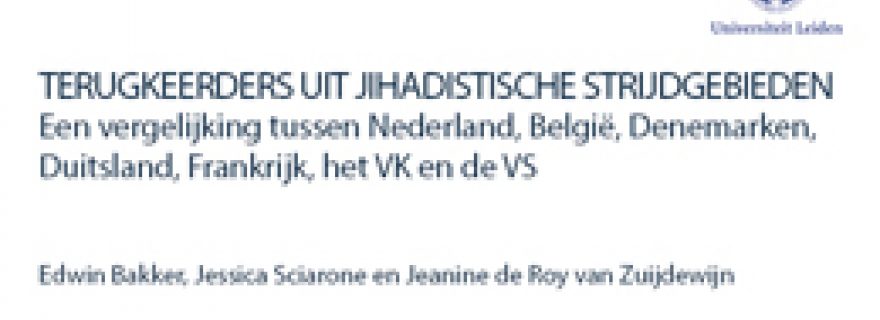Dealing With Returning Foreign Fighters From Jihadist Conflict Zones: Breaking the Deadlock
Comparative study into policies on returnees with a particular focus on women and children observes that there is a policy deadlock in most of these countries.
Late March, the so-called Islamic State (IS) lost its last stronghold in Syria, the city of Baghouz, to the Syrian Democratic Forces (SDF). Thousands of IS fighters and their families surrendered to the SDF forces and are currently held by Kurdish forces in prisons or refugee camps. Among them are several European men, women and children. There is an ongoing debate in their countries of origin about whether or not these people should be actively helped to return home. In a comparative study into policies on returnees with a particular focus on women and children, we observed that there is a policy deadlock in most of these countries [read full report in Dutch here].
Studying the policy developments regarding the issue of returnees in the period 2017-2018, we see that little has changed as compared to earlier years: potential returnees are not actively helped in the countries that we have studied (the Netherlands, Belgium, Germany, France, Denmark, UK, US). The question of what to do with particularly the women and children has become a widely debated topic. A few weeks ago, the case of the British Shamima Begum and her Dutch husband Yago Rietdijk made headlines, when Begum told BBC News that she wanted to return to the UK from Syria with her baby. Both in the UK and the Netherlands, the authorities had a clear answer to Begum’s request: they would not help them with the return. The British Home Secretary ordered Begum would be deprived of her British nationality. A few weeks later, the baby, less than three weeks old, died from pneumonia.
The question what to do with women and children is a complex challenge because of security risks, legal and diplomatic issues and a lack of political will. In several countries, including the Netherlands, civil society organisations as well as judges have called upon the authorities to more actively assist the fighters and their families to return to be able to prosecute them, but not much has happened since. Governments share a reluctance to actively bring back foreign fighters, resulting in a deadlock.
In particular areas there seem to have been some developments. Since late 2018, more initiatives have been proposed to see how children could be brought back. Civil society organisations have recently expressed their willingness to assist women and children in their return. For instance, the Dutch Red Cross said it would do so if requested by the Dutch government. Last year, the Dutch Ombudsman for Children wrote a position paper asking the Dutch government to “take its responsibility to protect children”.
Despite these pleas, the Dutch authorities have made no (publicly visible) attempts to help women and children to return, in contrast to for instance France, Germany and the US. Contrary to many other countries, there are detailed plans ready in the Netherlands in the case that children do return, for instance made by the Dutch Council for Child Protection. Another observation regarding the Dutch situation is that policies at times contradict the judicial framework, such as when it comes to the right to be present at a trial.
The comparative study into returning foreign fighters from jihadist conflict zones shows the commonalities and differences in the policies taken by the different countries. It shows how all governments and authorities in the countries are struggling with this problem and that there currently is a policy deadlock. Providing a better understanding into the different ways countries deal with the issue of returning foreign fighters could help to break this deadlock.
The full report (in Dutch) can be read here.



